Looking for a way to brighten your child’s day? There’s nothing quite like the sound of a child’s laughter when they hear a silly joke. Kid-friendly jokes aren’t just entertaining—they’re also fantastic tools for developing language skills, critical thinking, and social connections while creating memorable family moments.
10 Hilariously Clean Kid Jokes That Will Make Everyone Giggle
- Why don’t scientists trust atoms? Because they make up everything! Kids might not understand the scientific pun, but they’ll laugh at the silly idea that something can’t be trusted because it makes things up.
- What do you call a fake noodle? An impasta! This play on “imposter” works great with kids who love pasta dishes like spaghetti and macaroni.
- How do you make a tissue dance? You put a little boogie in it! Children absolutely love this joke because it combines the silliness of dancing tissues with the word “boogie” that has multiple funny meanings.
- What did zero say to eight? Nice belt! This visual joke helps kids practice their number recognition while giving them a good laugh about how the number 8 looks like it’s wearing a belt.
- Why did the student eat his assignments? Because the teacher said it was a piece of cake! Kids who struggle with assignments will particularly appreciate this literal interpretation of a common phrase.
- What do you call a dinosaur that crashes into things? A Stego-sore-us! Dinosaur jokes are always a hit with children who are fascinated by these prehistoric creatures.
- What’s brown and sticky? A stick! The simplicity of this joke makes it perfect for younger children who are just developing their sense of humor.
- Why couldn’t the bicycle stand up by itself? Because it was two-tired! This pun works on multiple levels as kids visualize a sleepy bicycle that can’t stand because it has two wheels.
- What has ears but cannot hear? A cornfield! This riddle-style joke encourages children to think critically about different meanings of words while giving them a chuckle.
- How do you organize a space party? You planet! This astronomy-themed joke introduces kids to wordplay while teaching them about outer space concepts in a fun way.
Knock-Knock Jokes That Never Get Old
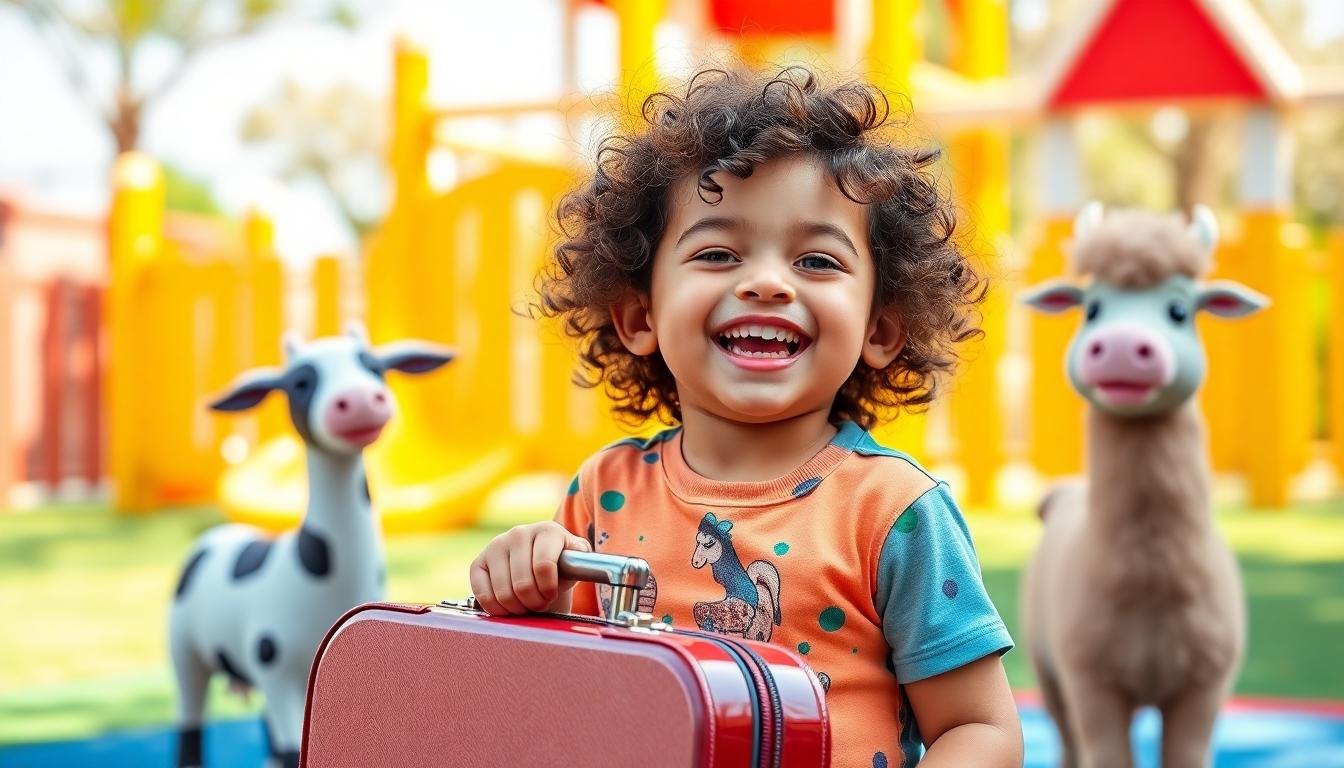
Knock-knock jokes remain timeless favorites among kids due to their playful structure and simple humor. These jokes follow a familiar pattern that even young children can quickly learn and participate in.
Classic Door-Opening Humor for Children
These easy-to-remember jokes involve basic wordplay that appeals perfectly to children’s developing sense of humor:
- Boo: Knock, knock. Who’s there? Boo. Boo who? Don’t cry, it’s just a joke!
- Lettuce: Knock, knock. Who’s there? Lettuce. Lettuce who? Lettuce in, it’s cold out here!
- Atch: Knock, knock. Who’s there? Atch. Atch who? Bless you!
- Little Old Lady: Knock, knock. Who’s there? A little old lady. A little old lady who? I didn’t know you could yodel!
Animal-Themed Knock-Knock Jokes
Animal jokes add an extra layer of fun with characters kids immediately recognize and love:
- Alpaca: Knock, knock. Who’s there? Alpaca. Alpaca who? Alpaca the suitcase, you load up the car!
- Cow Says: Knock, knock. Who’s there? Cow says. Cow says who? No silly, cow says moo!
- Nobel: Knock, knock. Who’s there? Nobel. Nobel who? Nobel (no bell), that’s why I keep knocking!
Silly Animal Jokes Your Kids Will Love to Share
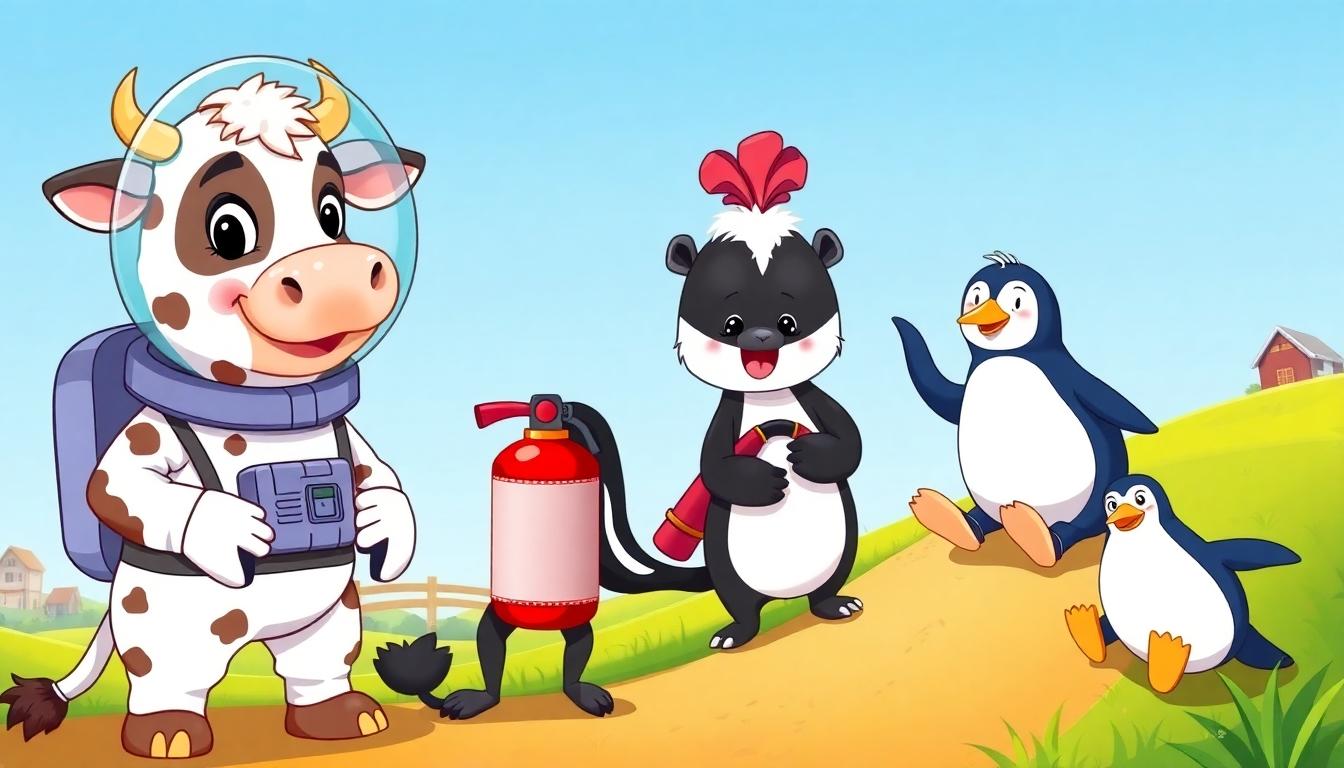
- Why did the cow become an astronaut?
Because it wanted to walk on the moon!
- What do you call a box full of ducks?
A box of quackers!
- Why are teddy bears never hungry?
Because they’re always stuffed!
- Why do fish live in schools?
Because they’re smart!
- Why did the snake cross the road?
To get to the other sssssssside!
- What do you call a cow that won’t give milk?
A milk dud!
- Why is a penguin rolling down a hill black and white, black and white?
Because it’s a penguin rolling down a hill!
- How does a skunk put out a fire?
With an ex-stink-guisher!
- How does a turtle call its friends?
With a shell phone!
- What kind of mother allows her children to go to bed with their shoes on?
A horse!
Barnyard Laughs That Never Fail
- What did the mouse say to the other mouse when he tried to take his cheese?
That’s nacho cheese!
- Why didn’t the chicken cross the road?
Because there was a KFC on the other side!
- What do hedgehogs say when they kiss?
Ouch!
- Where do you put barking dogs?
In a barking lot!
- What day do chickens hate most?
Frydays!
Wild and Wacky Zoo Animal Jokes
- Where do polar bears vote?
The North Poll!
- What did the judge say when the skunk walked into the courtroom?
Odor in the court!
- How does a penguin feel after its friend moves away?
Ice-olated!
- What do you get when a chicken lays an egg on top of a barn?
Food Puns and Jokes That Are Deliciously Funny

Fruit and Vegetable Jokes
Looking for some ap-peel-ing humor? These fruit and vegetable jokes will make kids giggle while they eat their greens. Try asking your little one why the slice of bread got sent home from school—the answer is because it was feeling crumby! Children also love hearing about what a potato’s favorite day is (Fry-day, of course). Eggs make excellent comedians because they’re always yolking around. Kids can’t resist asking their friends what you call cheese that isn’t yours, just to deliver the punchline: nacho cheese! Family dinner conversations become more entertaining when someone asks what the baby corn asked its mom (“Where is pop corn?”). When struggling with a tight lid, remind your children you couldn’t open the jar because you were in a jam. For the perfect party joke, ask how veggies throw a party—they tell the DJ to turnip the beet!
Sweet Dessert Jokes
Dessert jokes are just as sweet as the treats themselves! Ask your kids what kind of dessert is never on time, and watch them smile when they learn it’s choco-late. Have they heard the joke about peanut butter? We’re not telling—they might spread it! Children find it hilarious when you ask why you shouldn’t tell an egg a joke (because it might crack up). During pie time, pose the question about what’s the best thing to put in a pie, with the surprising answer being “your teeth!” These dessert-themed jokes provide the perfect sweet ending to any meal time and encourage kids to play with language while enjoying their favorite treats.
General Food Humor
Food jokes span beyond exact categories and offer a smorgasbord of laughs. Kids particularly enjoy learning what a pickle in formal wear looks like—it’s black, white, green, and bumpy (a pickle wearing a tuxedo)! They’ll also chuckle when asked why the fisherman used peanut butter (to pair with jellyfish). Children love discovering what a fake noodle is called—an impasta! Next time you’re at a seafood restaurant, ask your little ones why the man ordered white fish, then deliver the punchline: just for the halibut! These versatile food jokes work wonderfully in any setting, from school lunches to family dinners, making them perfect additions to your child’s growing collection of kid-friendly humor.
“Why Did” Jokes That Spark Curiosity and Laughter
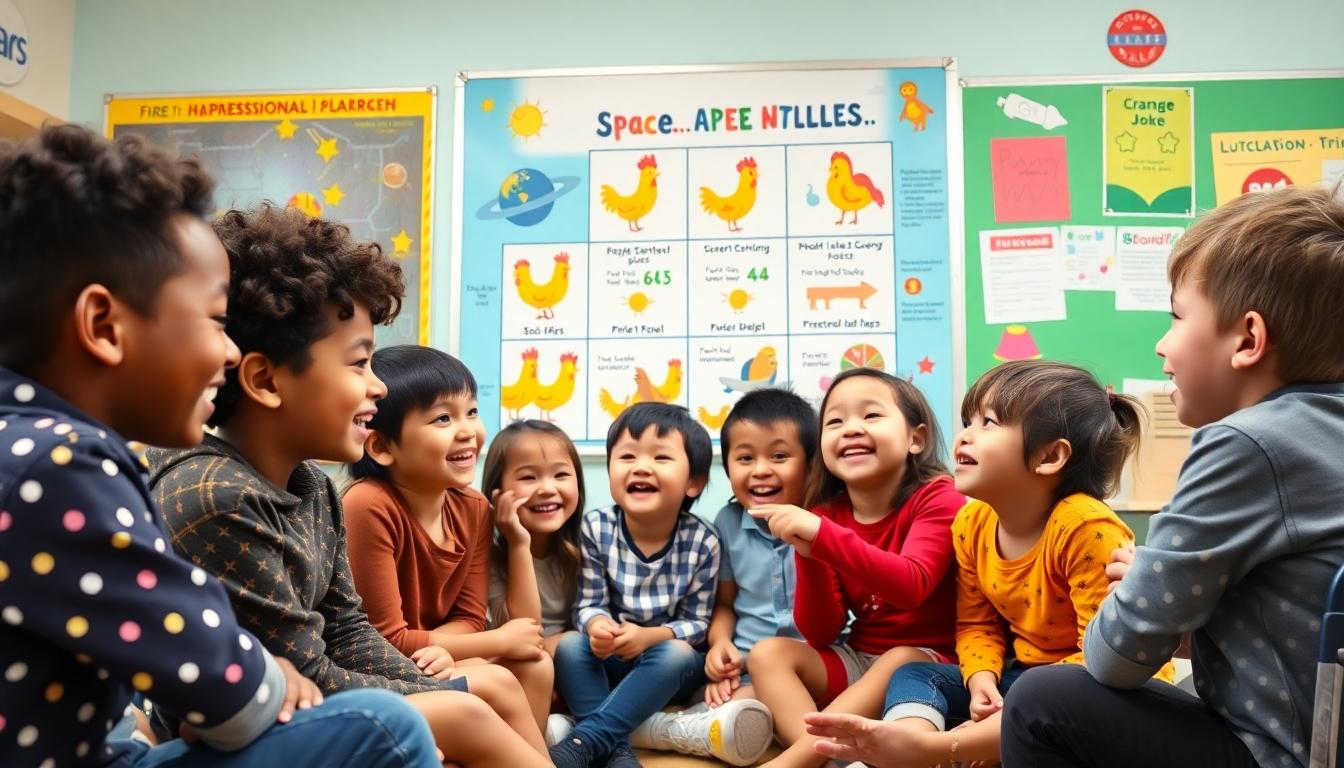
“Why did” jokes are perfect for captivating children’s developing minds, combining curiosity with unexpected punchlines that delight young audiences. These jokes leverage absurdity and wordplay to captivate children while supporting their cognitive development and emerging language skills.
Chicken Crossing Road Variations
The classic “Why did the chicken cross the road?” joke remains popular because of its adaptable format that grows with children’s understanding. Kids love extended punchlines like “Because the light was green!” that play with logical expectations in a way that’s accessible to their developing minds. For toddlers who appreciate physical humor, absurd twists such as “Why did the chicken cross the road? To escape his own fart!” deliver guaranteed giggles. Educational variations like “Why did the chicken cross the road? To visit the astronaut chicken on Mars!” cleverly introduce science concepts while maintaining the joke’s familiar structure. These variations work because they build on a familiar setup but surprise children with unexpected endings that challenge their growing understanding of how jokes work.
Space and Science “Why Did” Jokes
Space and science-themed “why did” jokes offer a stellar way to make learning fun while developing children’s curiosity about the industry around them. Astronomy jokes like “Why did the sun go to school? To get brighter!” connect everyday concepts with cosmic wonders in ways kids find hilarious. Biology humor such as “Why did the DNA helix break up? It had too many twists!” introduces scientific vocabulary through playful punchlines that stick in children’s memories. Physics becomes approachable with jokes like “Why did the electron bring a coat? It felt charged!” which transform complex concepts into accessible humor. These STEM-focused jokes work especially well with preschoolers and early elementary students who are beginning to categorize information and appreciate wordplay, creating laughter while reinforcing educational concepts in a format that’s easy to remember and share.
Math and School Jokes That Make Learning Fun
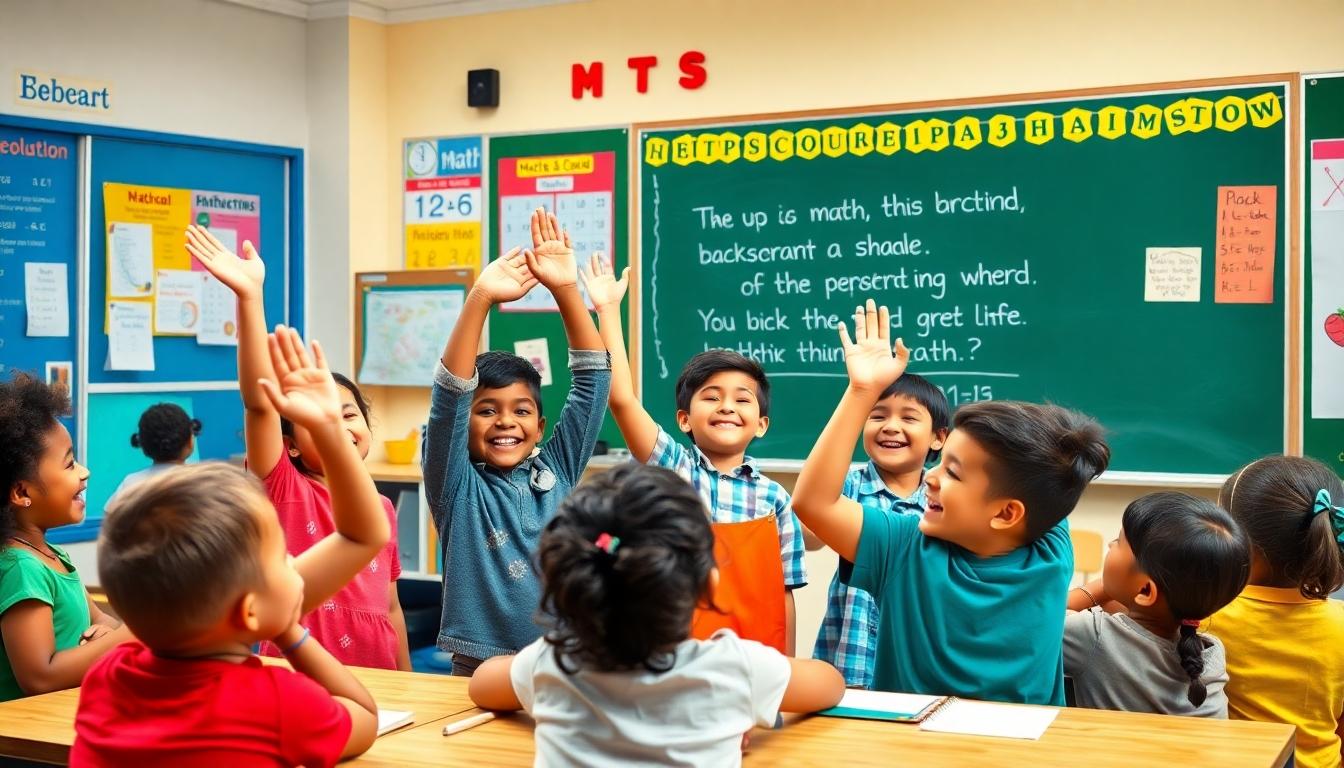
Math and school subjects can be fun when mixed with humor! These jokes help kids engage with educational concepts while enjoying a good laugh.
- Butterfly’s Favorite Subject: Why is the butterfly’s favorite subject in school? Mothematics! This clever wordplay combines “moth” and “mathematics” for a giggle-worthy punchline.
- Math Book Sadness: Why was the math book sad? Because it had too many problems! Kids will relate to this joke about the challenges of mathematics.
- Count Dracula’s Skill: Are monsters good at math? Not unless you Count Dracula! This spooky joke combines a classic monster with mathematical concepts.
- Why Six Feared Seven: Why was six afraid of seven? Because seven eight (ate) nine! This number joke is a classic that plays on number sequence and the double meaning of “eight.”
Number Puns That Add Up to Laughs
- Dollar and the Moon: How are a dollar and the moon similar? They both have four quarters! This joke teaches kids about money and lunar phases simultaneously.
- Quarter vs. Nickel: Why didn’t the quarter roll down the hill with the nickel? Because it had more cents (sense)! Children love this clever play on words between “cents” and “sense.”
- Mathemachicken: There once was a hen who counted her own eggs. She was a mathemachicken! This combines “mathematics” and “chicken” into a silly pun kids find delightful.
Teacher and Classroom Jokes
- Teacher’s Question: Teacher: Why are you turning in a blank sheet of paper? Student: Because all my answers are imaginary numbers! This joke works especially well with older elementary students learning about different types of numbers.
- Mean Average: Why did the student get upset when his teacher called him average? It was a mean thing to say! This clever joke plays on the statistical terms “mean” and “average.”
- Statistician’s Beach Visit: What did the statistician say when he went to the beach? “Finally, some normal distribution.” Kids learning about statistics will appreciate this mathematical beach humor.
Weather and Nature Jokes for Outdoor Adventures

Hilarious Weather Jokes
When you’re out exploring on a cloudy day, these weather jokes will brighten any outdoor adventure! Kids love giggling about the elements they experience firsthand.
- What did the tornado say to the sports car? “Want to go for a spin!”
- What kind of shorts do clouds wear? Thunderwear!
- What did one lightning bolt say to the other? “You’re shocking!”
- What happens when fog lifts in California? UCLA!
- Why did the woman go outdoors with her purse open? Because she expected some change in the weather!
Nature Jokes That Rock
These nature-themed jokes are perfect for hikes, camping trips, or simply enjoying time in the backyard.
- Why did the sun go to school? To get a little brighter!
- What kind of bow can’t be tied? A rainbow!
- What do you call a snowman in the rain? A puddle!
- Why is the lightning bolt always so fast? Because it doesn’t like to be grounded!
- What do you call it when a storm plays music? A thunder band!
Wild Weather Animal Jokes
Animals and weather combine for some paw-sitively funny punchlines that’ll have kids roaring with laughter during outdoor adventures.
- How did my cat know about tomorrow’s weather? He looked at the fur-cast!
- What type of humor does a dust storm have? A very dry sense of humor!
- What happens when it rains cats and dogs? You have to be careful not to step in a poodle!
These weather and nature jokes are perfect conversation starters during family hikes, camping trips, or while waiting out a rainstorm. They’re also great for teaching kids about weather phenomena in an entertaining way that makes science concepts stick.
Seasonal Jokes for Year-Round Laughter
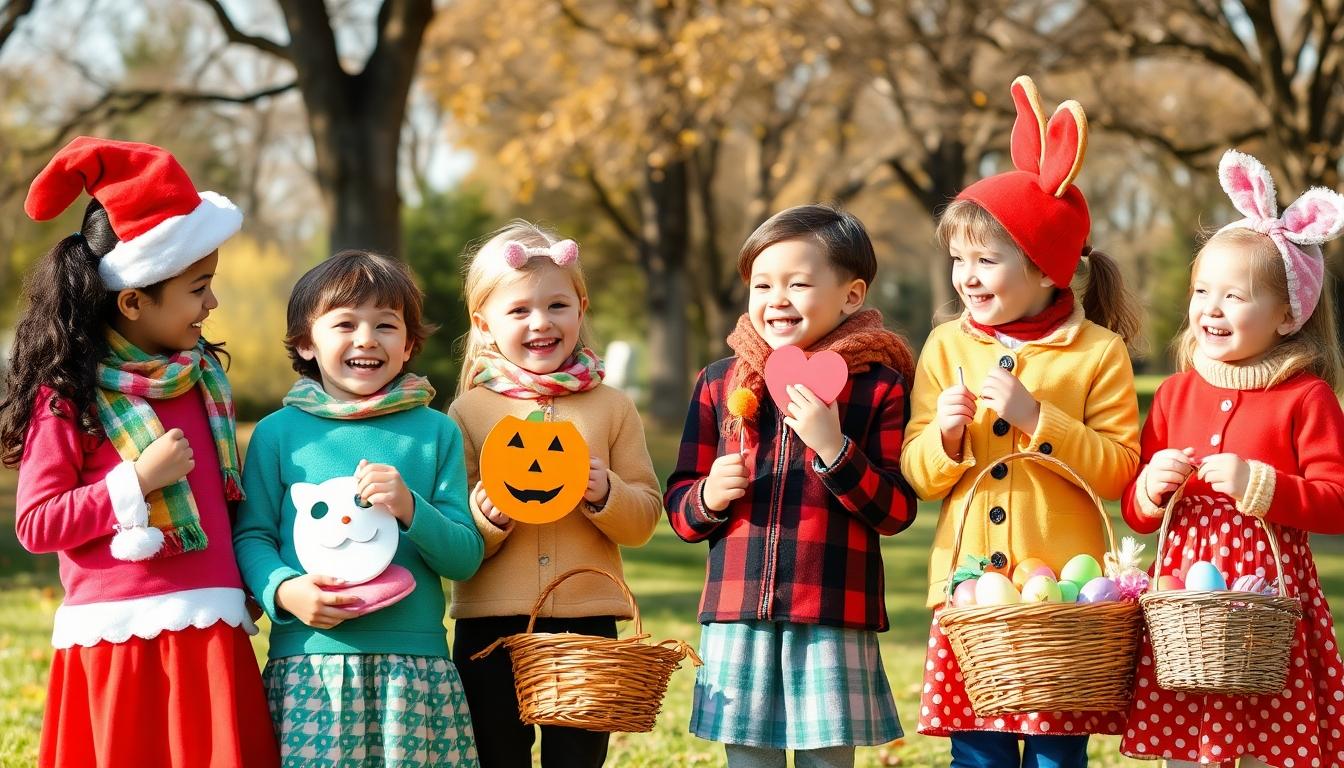
Holiday-Themed Kid Jokes
Kids love celebrating holidays with laughter, and these seasonal jokes are perfect for any special occasion. Christmas jokes bring extra cheer during the winter season and help children connect with holiday traditions through humor.
“Why was Santa’s little helper feeling sad? Because he had low elf-esteem!”
“What does Santa do when his elves misbehave? He gives them the sack!”
Halloween offers the perfect opportunity for spooky but silly jokes that kids can share while trick-or-treating:
“What’s a ghost’s favorite dessert? I-scream!”
“Why didn’t the skeleton go to the party? He had nobody to go with!”
Easter jokes hop into springtime fun with egg-cellent punchlines:
“What do you call a rabbit with fleas? Bugs Bunny!”
“How does the Easter Bunny stay in shape? Eggs-ercise!”
Thanksgiving provides a feast of funny moments with these turkey-day teasers:
“What’s a turkey’s favorite dessert? Peach gobbler!”
“Why did the turkey cross the road? To prove he wasn’t chicken!”
Summer and Winter Joke Showdown
Summer jokes bring sunshine to any conversation and create perfect moments for poolside giggles. Children particularly enjoy these warm-weather wisecracks during school breaks.
“Why did the sun go to therapy? It had a burning issue!”
“What did the ocean say to the beach? Nothing, it just waved!”
“How do we know that the ocean is friendly? It waves!”
Winter jokes create cozy laughter during the coldest months and offer children a way to embrace snowy days with humor.
“What falls in winter but never gets hurt? Snow!”
“What do snowmen eat for breakfast? Frosted Flakes!”
“Where do snowmen keep their money? In snow banks!”
Seasonal transition jokes help kids mark the changing of seasons with clever wordplay:
“What tree can fit into your hand? A palm tree!”
“How do trees access the internet? They log in!”
“What season is it when you’re on a trampoline? Spring time!”
Weather-themed jokes work year-round and connect children to the natural industry through humor:
“What does a cloud wear under its raincoat? Thunderwear!”
“How do hurricanes see? With their eye!”
Superhero and Character Jokes for Young Fans
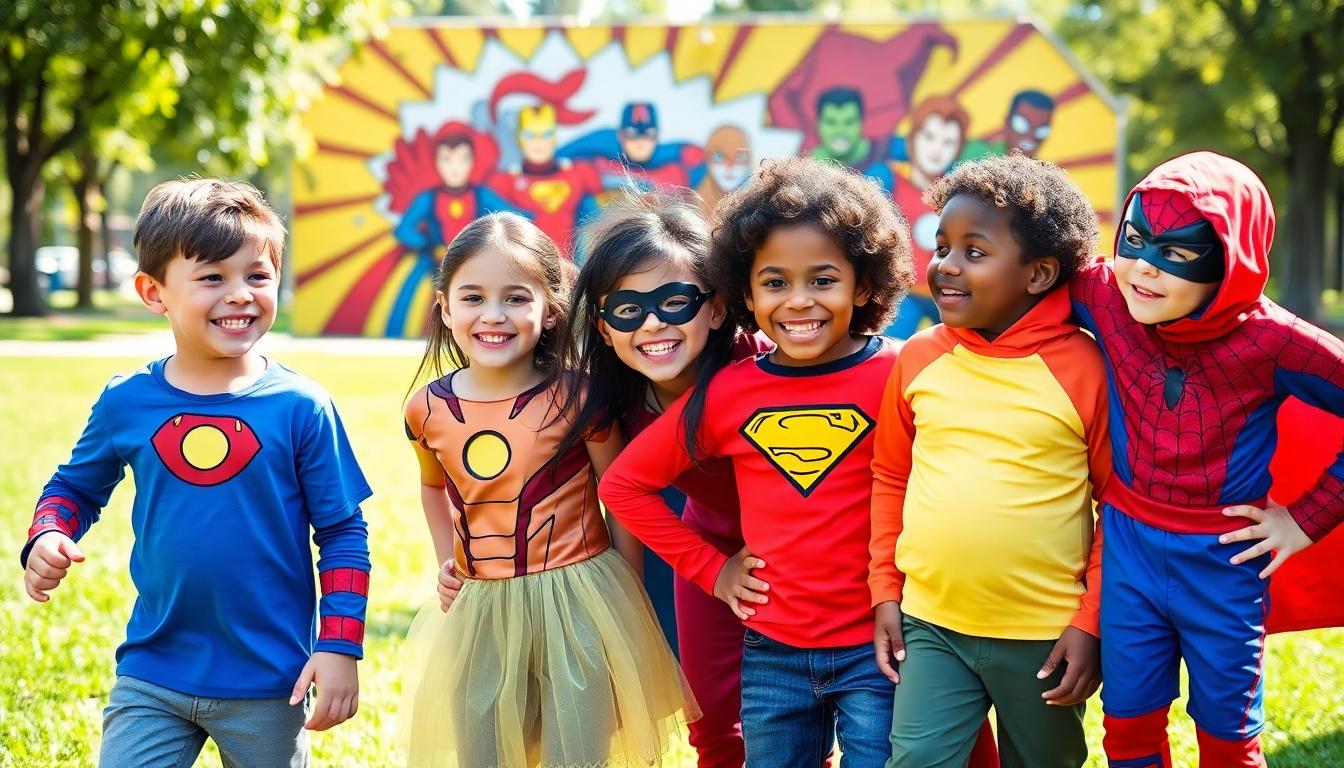
Marvel and DC Punchlines
Marvel and DC superheroes provide perfect material for kid-friendly jokes that’ll have young fans rolling with laughter. Iron Man jokes are particularly popular among children, with classics like “What’s Iron Man without his suit? Stark naked!” Spider-Man offers web-tastic humor that connects with kids, such as “Where does Spider-Man hang out? On the Industry Wide Web!” Superman jokes often play on his powers and name, like “Why was baby Superman alone? The playground required ‘supervision’!”
Superhero Wordplay Wonders
Superhero wordplay creates ingenious jokes that develop children’s language skills while keeping them entertained. Thematic connections between characters make for hilarious punchlines, like “What do Spider-Man and Ant-Man have in common? They both bug the villains!” Justice-themed jokes work wonderfully with certain characters, as in “How does Wonder Woman like her drinks? With just-ice!” Aquatic heroes inspire their own category of humor, with jokes such as “What’s Aquaman’s favorite bird? Sea-gulls!”
Creative Character Crossovers
Creative crossover jokes combine superheroes with everyday objects for maximum kid appeal. Food-based superhero jokes rank among children’s favorites, with gems like “What do you get crossing a superhero with a potato? Spuderman!” Bathroom humor (when kept clean) works wonderfully in this genre, evidenced by the popular “What’s a bathroom superhero called? Flush Gordon!” These playful combinations help children make unexpected connections while developing their sense of humor.
Age-Appropriate Hero Humor
Age-appropriate superhero jokes focus on silliness rather than complex themes, making them perfect for young audiences. Dental hygiene becomes hilarious with jokes like “Why did Batman rush to brush his teeth? Bat breath!” Pop culture references from recent movies and shows keep the jokes relevant for today’s kids, improving their enjoyment. Educational value comes naturally through wordplay, such as clever character name adaptations like “Lex Woofer” for Superman’s dog.
Simple Setups for Super Laughs
Simple joke structures work best for young superhero fans, making the humor accessible and easy to remember. Transportation themes provide reliable laughs, as in “Why did Spider-Man borrow his parents’ car? To take it for a ‘spin’!” Visual imagery makes jokes more memorable for children, like the clever baby Batman joke about his “crib mobile being a bat mobile.” These straightforward formats allow kids to grasp the humor quickly while encouraging them to create their own superhero jokes.
How to Deliver Kid Jokes for Maximum Laughter
Kid jokes bring so much more than just laughter to children’s lives. They’re powerful tools for developing language skills critical thinking and creating lasting family memories.
We hope this collection of clean jokes knock-knock classics animal puns food humor and superhero quips has given you plenty of ammunition for your next family gathering or classroom activity.
Remember timing and delivery make all the difference. Pause before the punchline watch their faces light up and don’t forget to laugh along with them. The joy of sharing jokes creates connections that last well beyond the moment.
So keep these jokes in your back pocket for rainy days car rides or anytime you need to brighten a child’s day. After all a childhood filled with laughter is truly a gift that keeps on giving.
Frequently Asked Questions
Why are jokes important for child development?
Jokes help children develop language skills, critical thinking, and social connections. When kids share jokes, they practice vocabulary, timing, and social cues while building confidence. Humor also creates family bonding moments and helps children understand different perspectives, all while having fun and creating happy memories.
What makes a good kid-friendly joke?
Good kid-friendly jokes use clean humor, simple language, and age-appropriate concepts. They should avoid sarcasm, mature themes, or complicated wordplay that young children might not understand. The best jokes include elements of surprise, visual imagery, or playful puns that children can easily remember and share with friends and family.
How can knock-knock jokes benefit children?
Knock-knock jokes teach children about conversation patterns, timing, and social turn-taking. These structured jokes help develop verbal skills, memory, and confidence in social situations. They’re particularly valuable for younger children who are just beginning to understand humor, providing a simple format that reinforces language development while creating shared moments of laughter.
Are animal jokes good for educational purposes?
Yes! Animal jokes combine humor with learning opportunities. They introduce children to animal characteristics, behaviors, and habitats in a memorable way. When kids laugh at jokes about cows becoming astronauts or polar bears voting at the “North Poll,” they’re also absorbing information about animals that supports science education and natural curiosity.
How can food jokes encourage healthy eating habits?
Food jokes make fruits, vegetables, and healthy foods more approachable and fun for children. When kids laugh about a potato’s favorite day being “Fry-day” or bread feeling “crumby,” they develop positive associations with these foods. Parents can use these jokes during mealtimes to create a lighthearted atmosphere that makes trying new foods more enjoyable.
What makes “why did” jokes so popular with children?
“Why did” jokes appeal to children’s natural curiosity and love of questioning. The familiar format creates anticipation, while unexpected punchlines deliver satisfaction and surprise. These jokes help develop critical thinking as kids learn to connect the setup with the punchline. The adaptable structure also allows children to create their own variations, encouraging creativity.
How can math and school jokes make learning more enjoyable?
Math and school jokes transform potentially challenging subjects into sources of fun. Jokes like “Why was six afraid of seven? Because seven ate nine!” make abstract concepts more relatable and memorable. These jokes reduce anxiety around difficult subjects and create positive associations with learning, helping children approach education with a more open and enthusiastic mindset.
What’s the best age to introduce different types of jokes?
Start with simple physical humor and sound-based jokes for toddlers (ages 2-3). Preschoolers (ages 3-5) enjoy knock-knock jokes and straightforward punchlines. Elementary children (ages 6-9) appreciate wordplay, puns, and jokes with more complex setups. By ages 10-12, kids understand more sophisticated humor including character jokes and wordplay requiring broader knowledge.
How can seasonal jokes enhance holiday celebrations?
Seasonal jokes create anticipation and excitement around holidays while reinforcing cultural traditions. They provide families with shared humor during special times and give children season-specific vocabulary and concepts. These jokes can become part of yearly traditions, with children looking forward to telling and hearing familiar holiday humor that grows with them.
Can superhero jokes help children connect with popular culture?
Absolutely! Superhero jokes help children engage with popular characters while developing their sense of humor. These jokes create common ground among peers who share similar interests and provide opportunities for kids to demonstrate knowledge about their favorite characters. They also encourage creativity as children invent their own jokes about beloved superheroes.







